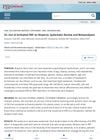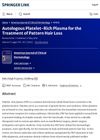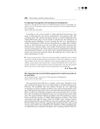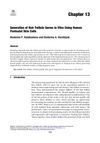The right balance of Myo-Inositol to D-Chiro-Inositol in follicular fluid is crucial for good egg and embryo quality.
 November 2013 in “Journal of clinical & experimental dermatology research”
November 2013 in “Journal of clinical & experimental dermatology research” Using urinary bladder matrix and platelet rich plasma can effectively treat transplant scars and prevent hair loss.
 September 2013 in “Regenerative Medicine”
September 2013 in “Regenerative Medicine” γδ T cells help with hair growth during wound healing in mice.
 7 citations,
March 2017 in “Medical Hypotheses”
7 citations,
March 2017 in “Medical Hypotheses” Aquaporins could be new drug targets for treating polycystic ovary syndrome.
 November 2023 in “International journal of reproduction, contraception, obstetrics and gynecology”
November 2023 in “International journal of reproduction, contraception, obstetrics and gynecology” Polycystic ovary syndrome causes high male hormone levels, leading to symptoms like excess hair, acne, and fertility problems.
 May 2023 in “Plastic and reconstructive surgery. Global open”
May 2023 in “Plastic and reconstructive surgery. Global open” Activated PRP injections are effective in treating hair loss and improving hair density.
 18 citations,
July 2010 in “Expert Review of Endocrinology & Metabolism”
18 citations,
July 2010 in “Expert Review of Endocrinology & Metabolism” The document concludes that PCOS has a strong genetic component, but more research is needed to fully understand the specific genes involved.
 1 citations,
February 2012 in “The American Journal of Cosmetic Surgery”
1 citations,
February 2012 in “The American Journal of Cosmetic Surgery” UBM helps hair regrowth in men and women with hair loss.
 232 citations,
December 2005 in “Andrology”
232 citations,
December 2005 in “Andrology” PCOS is caused by both genetics and environmental factors like diet and obesity.
 43 citations,
March 2009 in “Journal of Cellular and Molecular Medicine”
43 citations,
March 2009 in “Journal of Cellular and Molecular Medicine” TGF-β2 plays a key role in human hair growth and development.
 42 citations,
May 2016 in “American Journal of Clinical Dermatology”
42 citations,
May 2016 in “American Journal of Clinical Dermatology” Using platelet-rich plasma, which is full of growth factors, can help treat pattern hair loss.
 January 2023 in “Pharma innovation”
January 2023 in “Pharma innovation” Polycystic ovary syndrome affects health and can be hard to diagnose, with treatments ranging from drugs to herbal remedies.
 January 2008 in “The Year book of dermatology”
January 2008 in “The Year book of dermatology” After skin injury, adult mice can grow new hair follicles, and this process can be increased or stopped by manipulating Wnt signals.
 5 citations,
January 2020 in “Bioscience Reports”
5 citations,
January 2020 in “Bioscience Reports” Certain changes in the VEGF gene can increase or decrease the risk of polycystic ovary syndrome.
October 2021 in “Plastic and reconstructive surgery. Global open” Adipose-derived stem cells may help treat hair loss.
 January 2017 in “Springer eBooks”
January 2017 in “Springer eBooks” Scientists made working hair follicles using stem cells, helping future hair loss treatments.
 24 citations,
March 2017 in “Archives of Gynecology and Obstetrics”
24 citations,
March 2017 in “Archives of Gynecology and Obstetrics” The study found that women with hyperandrogenic PCOS have higher levels of AKT1 and AKT2 proteins in their cells, which may lead to cell dysfunction.
 2 citations,
May 2017 in “InTech eBooks”
2 citations,
May 2017 in “InTech eBooks” Stem cells could improve hair growth and new treatments for baldness are being researched.
 1 citations,
February 2022 in “Experimental Dermatology”
1 citations,
February 2022 in “Experimental Dermatology” Certain proteins are found at higher levels in balding areas compared to non-balding areas, suggesting a link to hair loss. This could be useful for diagnosing and treating hair loss.
 1 citations,
November 2022 in “International Journal of Molecular Sciences”
1 citations,
November 2022 in “International Journal of Molecular Sciences” Kelulut Honey can help regulate sex hormone receptors in rats with Polycystic Ovary Syndrome, similar to common medications.
 2 citations,
January 2020 in “Methods in molecular biology”
2 citations,
January 2020 in “Methods in molecular biology” Scientists created early-stage hair follicles from human skin cells, which could help treat baldness and study hair growth.
 12 citations,
January 2016 in “Journal of Assisted Reproduction and Genetics”
12 citations,
January 2016 in “Journal of Assisted Reproduction and Genetics” Certain gene variations are linked to higher male hormone levels in Chinese women with PCOS and insulin resistance.
 37 citations,
March 2006 in “Regulatory Peptides”
37 citations,
March 2006 in “Regulatory Peptides” Mice skin has components that could help with hair growth and might be used for diabetes treatment.
1 citations,
January 2024 in “International journal of molecular sciences” MicroRNAs could be key biomarkers and therapeutic targets for PCOS.
 May 2024 in “Internattional journal of current innovation in advance research”
May 2024 in “Internattional journal of current innovation in advance research” Lifestyle changes like a healthy diet, exercise, and proper sleep can help manage PCOD.
 December 2024 in “African Journal of Biomedical Research”
December 2024 in “African Journal of Biomedical Research” Combining lifestyle changes and medication is most effective for managing PCOS symptoms.
 829 citations,
May 2007 in “Nature”
829 citations,
May 2007 in “Nature” Hair follicles can regrow in wounded adult mouse skin using a process like embryo development.
 96 citations,
April 2007 in “Journal of Investigative Dermatology”
96 citations,
April 2007 in “Journal of Investigative Dermatology” Grafted rodent and human cells can regenerate hair follicles, but efficiency decreases with age.
 April 2017 in “Journal of Pharmaceutical Investigation”
April 2017 in “Journal of Pharmaceutical Investigation” Indole-based compounds improved ovarian health in rats with PCOS, with L-Tryptophan and Tryptophol being most effective.
 4 citations,
October 2022 in “Evidence-based complementary and alternative medicine”
4 citations,
October 2022 in “Evidence-based complementary and alternative medicine” Ficus carica extract improved fertility in rats and may help with certain health conditions.


























